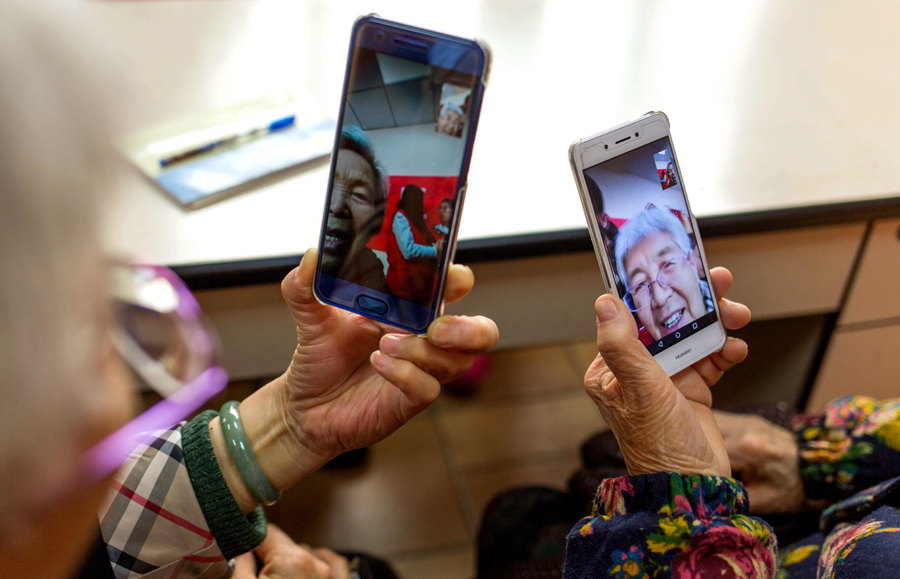China's aging internet explorers
 0 Comment(s)
0 Comment(s) Print
Print E-mail China Daily, April 17, 2018
E-mail China Daily, April 17, 2018
Those aged 50 or older comprise more than 10% of the online population, making them a growing force in cyberspace, as Xinhua reports.

When most of his friends are working in the fields, 53-year-old Jiang Licun is living a life of fame on the internet.
Putting on a headset, Jiang records a popular song on a singing app on his mobile phone and uploads it. Within a few minutes, the song has more than 20 comments and some listeners give him virtual flowers as encouragement.
"I like reading the comments, and I usually reply one by one," said Jiang, who lives in eastern China's Anhui province.
Sharing songs online is Jiang's favorite pastime and his online activity could be seen as typical of many members of China's vast elderly population, who have been considered an "unconnected group" in the internet age because many struggle with the devices and processes needed to gain access to the internet.
But that might no longer be the case, with a report by the China Internet Network Information Center saying that by the middle of last year, roughly 25 percent of China's 751 million internet users were aged 40 or above.
Those aged 50 or more accounted for over one-tenth of the online population, up by more than 10 percent from the end of 2016, the report said.
That makes the elderly an ever-growing force in cyberspace as they follow news, search for and share information, shop, seek entertainment and stay connected with family and friends via the internet.
For many, online music platforms such as Tencent's We-Sing have created a new stage. They can find songs released in the 1980s and '90s on such platforms, connect with other singers who share similar tastes, and even sing together with a complete stranger.
"I have uploaded 133 songs, and I have 442 followers on WeSing," Jiang said. "My daughter said that I use the app much better than she does."
By the end of 2016, more than 230 million Chinese were older than 60, according to the Ministry of Civil Affairs. The government predicts the country's elderly will account for about 25 percent of the population by 2030.
In an era of information accessibility, many elderly people are beginning to explore the internet to enrich their lives, with 98.5 percent using Tencent's WeChat messaging app.
About 70 percent make videos to share online, 40 percent use the internet to pay mobile phone bills and 30 percent shop online, according to a report by Tencent and the Chinese Academy of Social Sciences. Many also know how to give money in virtual red envelopes-or hongbao-via WeChat.
"I had a video chat with my grandson yesterday," said Pan Xuelan, 60. "He looked fatter than last time."
Pan's daughter bought her a smartphone and taught her how to use WeChat.
"I chat with my family every week on WeChat," Pan said. "The internet truly makes life easier."
Elderly WeChat users have even created a series of special emojis, featuring various big characters and extremely bright colors. A report by Tencent said they are usually filled with "positive energy".
Such emojis, which carry traditional messages such as "Wish you every success!" and "Have a wonderful morning!", are considered dated by many young people, but appeal to some due to their retro feel.
"For every holiday, my mom sends me such emojis," said Chen Xiaojie, a teacher in Beijing. "For example, for New Year's Day, she sent me a spinning emoji with the Chinese characters for happy holidays."
For the National Day holiday in October, she sent him an emoji containing a shiny character for the motherland, followed by two dancing characters saying "long life".
"Her emojis have always been direct and simple, but also filled with best wishes," Chen said.
Chen added that many elderly love the idea of sharing articles about health and traditional Chinese medicine as well as "chicken soup for the soul" with friends on WeChat.
For others, like 67-year-old retiree Yin Yuzhen, using internet tools helps make life much easier.
Yin and her husband live on the fourth floor of a building in Beijing that has no elevator.
"Shopping for heavy items like cooking oil and staple foodstuffs such as rice and flour used to be a big headache," she said. "Now we have delivery of such things to our doorstep, sparing us from that trouble."
When going out, Yin usually books a car service via an app on the smartphone her son gave her two years ago as a birthday gift.
"Nowadays, we cannot live without the internet and the mobile phone, particularly when our son is far away from us," she said.
However, every coin has two sides. As many elderly become more interested in the internet, some of their children have expressed concern.
"My father is addicted to surfing the internet these days," Jiang's daughter said. "His eyesight is not every good, and I worry that replying to messages on the singing platform will be bad for his health."
Liu Jun, an office clerk in Wuhan, Hubei province, also expressed concern about the health effects of her 68-year-old father's "internet addiction".
She said he stays online for an average of four hours a day, and that meant "he doesn't go out and engage in physical exercise as before, which might not be good for his health".
Zhao Jie, a business professor at Anhui University who has conducted research on the use of micro blogs, said the need for emotional communication and socializing prompted many elderly to explore the internet.
"Their children should spend more time with them, and encourage them to go out rather than staying at home," Zhao said. "Their lives will become more abundant with more companionship, and they will rely less on the internet."






Go to Forum >>0 Comment(s)